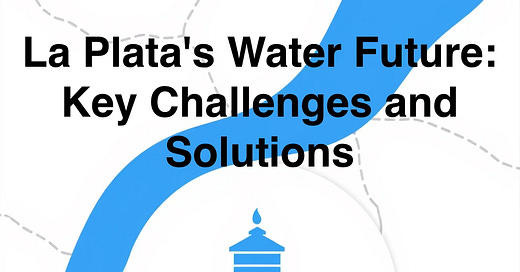La Plata's Water Future: Key Challenges and Solutions
By: Paul Guttenberg, Candidate for Town Council Ward 1
Our Water Challenges:
Challenge 1: Securing Long-Term Water Capacity Agreements:
(Increased Capacity, Demand Conservation, and New Sources)
La Plata's primary water resource challenge is to augment its access to a sufficient water supply, which is essential for supporting anticipated population and economic growth. This issue has been on our horizon for many years but has now become more urgent to resolve due to the current residential expansion happening in the town. While current forecasts indicate permitted water capacity can service existing approved developments within the town, any new developments not already underway will undoubtedly be impacted until this issue is resolved.
Challenge 2: Upgrade and Maintain Sewer Infrastructure:
(Addresses Capacity and System Aging)
La Plata needs to upgrade its sewage treatment plant and the sewage collection systems which are nearing capacity to handle near term growth while addressing system wide aging of infrastructure across the sewer system.
Challenge 3: Meet Stormwater Permit Requirements from Maryland Department of Environment (MDE) Municipal Separate Storm Sewer System (MS4):
(Focuses on Funding, Compliance, and Key Outcomes)
We must balance funding, infrastructure maintenance, regulatory compliance, and development impacts to ensure effective stormwater management requirements and objectives are met.
Solving La Plata’s Water Challenges Related to Development:
I believe the 2020 Comprehensive Plan provides a robust framework for managing these critical water challenges. This plan, the result of extensive resident engagement, town resources, and intergovernmental collaboration conducted over 2 ½ years culminating in its 2020 adoption by the town council sets forth clear goals and actions that address 9 elements each with corresponding goals, actions, measures and Budget Completion Targets including their intended timeframes: First 2 Years, Years 3 – 5, Years 6 – 10, Ongoing/Not Time Bound.
To ensure we effectively apply the comprehensive plan that is now 4+ years into implementation, I propose to develop a set of plan “scorecards”. The scorecards will translate the plan's 32 goals and dozens of pages of detailed actions and budget completion targets into easier-to-read and understand scorecards, representing an assessment of each of the comprehensive plan’s 9 elements.
Scorecards will assess plan goals using measurable questions, integrated into existing department reporting, with updates to the town council occurring quarterly or biannually. A clear scoring system will be applied to responses from the town department managers, allowing the Town Council to do two things.
Prioritize issues and advise the mayor and town manager on scorecard areas where the council agrees departments need improvement or additional resources to execute and operate to the plan.
Better engage with residents to communicate clear information about our status on management of the comprehensive plan’s goals.
I believe an organized approach like this will help re-energize the comprehensive plan with the council and town staff so we can effectively prioritize mitigations to the impacts of growth on all elements of the plan including how we manage Water Resources and Environmentally Sensitive Areas.




